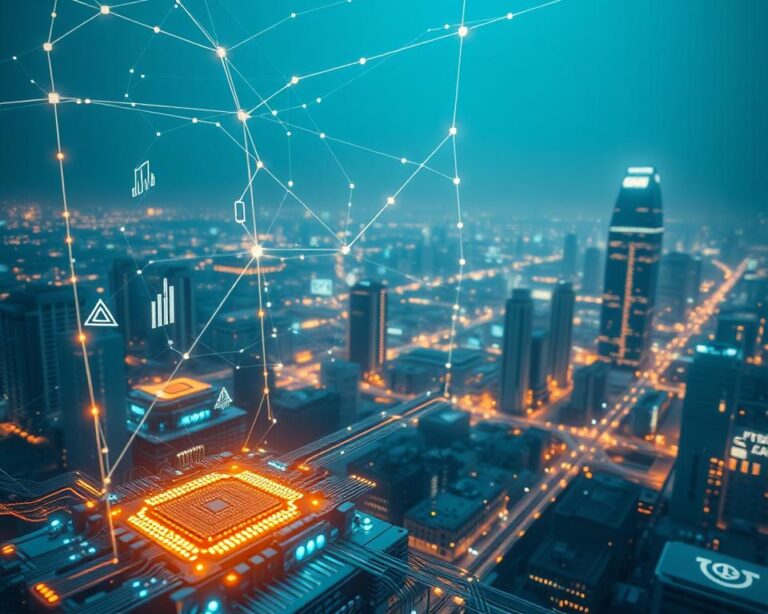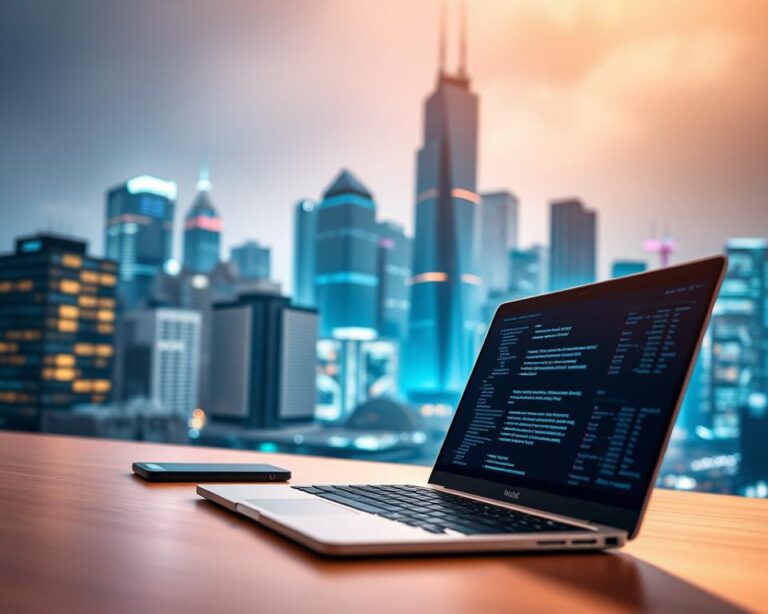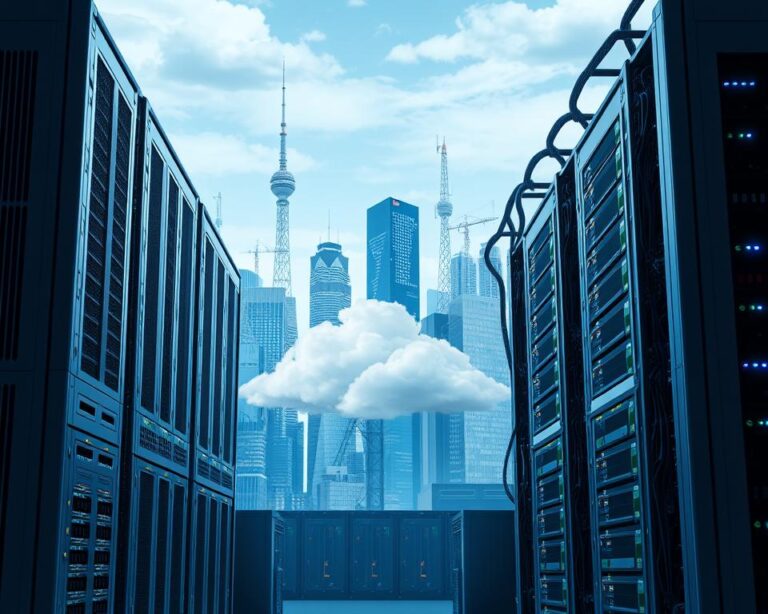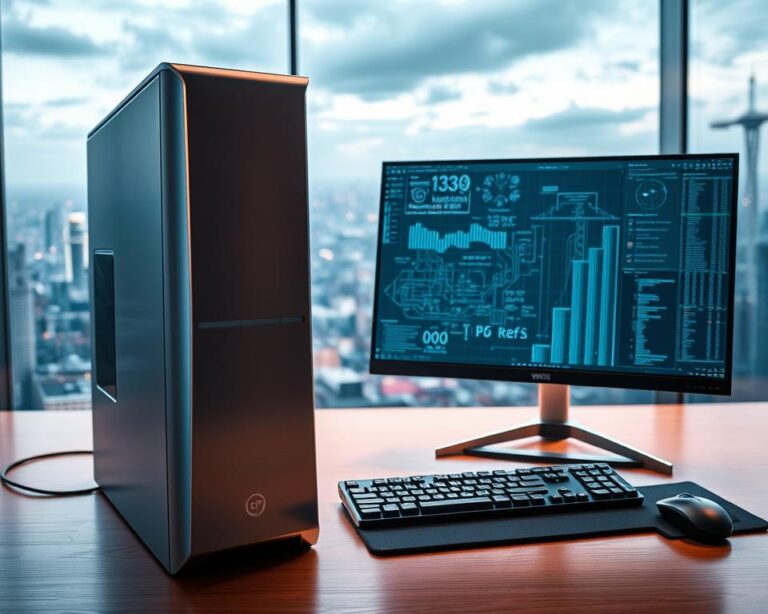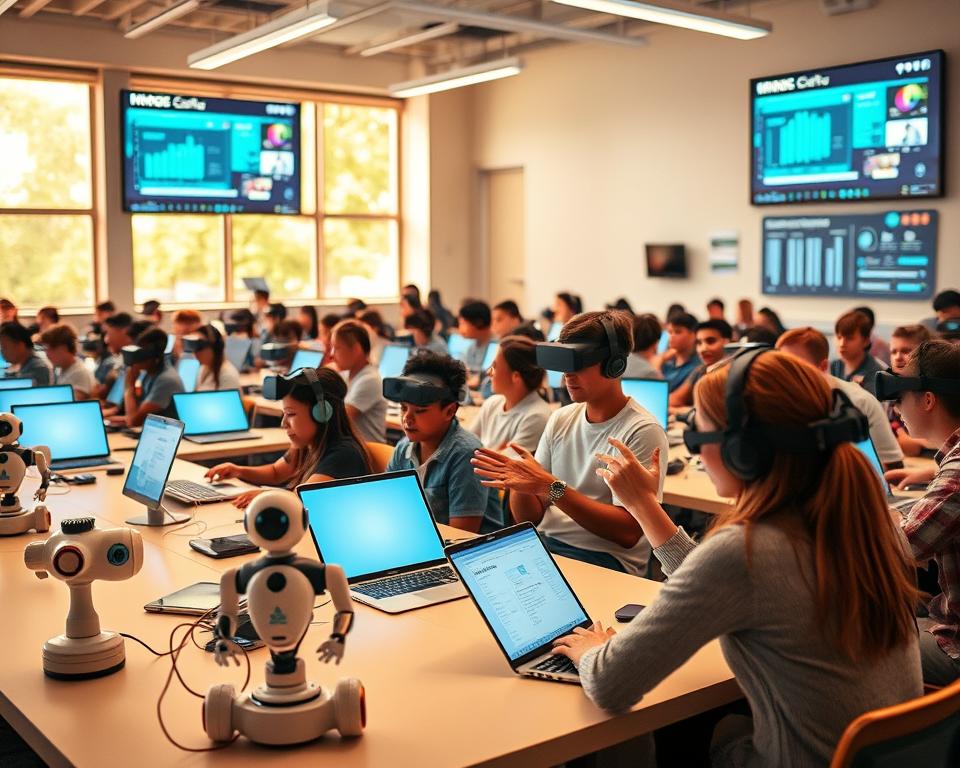
Modern Technology: Shaping the Future in an Essay
Did you know that over 60% of the global population now uses the Internet, transforming the way we interact, learn, and conduct business? This staggering statistic highlights the impact of technology on society and emphasizes the transformative role of technology across various domains. In this modern technology essay, we will explore how advancements in technology are not only reshaping communication but also influencing diverse industries such as healthcare, education, and remote work. As we delve deeper into the digital revolution, we will uncover how these changes affect our everyday lives and stimulate new opportunities for growth and innovation.

Key Takeaways
- The Internet has over 60% global usage, reflecting technology’s impact.
- Modern technology reshapes communication and industry practices.
- The digital revolution offers new learning and work opportunities.
- Technological advancements are key to professional growth.
- Understanding technology’s role is essential for future success.
The Impact of Technology on Society
Technology in society has changed the way we live, work, and communicate. From the early days of the internet to today’s instant messaging and video conferencing tools, we have witnessed a profound shift in communication methods. These advancements are revolutionizing communication across the globe, creating opportunities for connection that were once unimaginable.
Revolutionizing Communication
Platforms like WhatsApp and Zoom exemplify how technology enhances our ability to connect with others. Instant messaging has become a staple in both personal and professional spheres, allowing for real-time interaction regardless of location. Video calls have emerged as a viable alternative to face-to-face meetings, providing a sense of presence that text alone cannot achieve. The convenience and immediacy of these tools have transformed how individuals and businesses communicate, fostering stronger relationships and collaborations.
Transforming Industries
The effects of technology extend beyond communication, penetrating various industries and fundamentally altering their operations. In retail, e-commerce giants like Amazon have redefined the shopping experience, making it easier for consumers to purchase goods with just a click. The manufacturing sector has embraced automation and artificial intelligence to increase productivity and reduce costs. The automotive industry is undergoing a significant transformation with advancements in electric vehicles and self-driving technology. These developments not only streamline operations but also enhance customer experiences, driving new business models that adapt to changing market demands.

Understanding the Digital Revolution
The digital revolution marks a profound shift from analog to digital technologies, fundamentally altering how society functions. This transition began in the late 20th century with the advent of personal computing. Companies like IBM and Apple played pivotal roles, making computers accessible to the masses. The impact of technology became more pronounced as the internet emerged, democratizing information. Today, this vast network connects people around the globe, allowing for instant communication and access to vast resources.
As the digital revolution has progressed, it has transformed daily life in unprecedented ways. In the workplace, remote collaboration tools enhance productivity. Whether through video conferencing platforms like Zoom or project management software such as Trello, modern technology reshapes professional environments. Furthermore, shopping, socializing, and learning have all evolved into more efficient and engaging experiences thanks to digital advancements.
In this context, many individuals explore these themes in a modern technology essay. This academic approach encourages a deeper understanding of how technology intertwines with everyday existence, reshaping interactions and experiences. The insights gained from analyzing this transition reveal the foundational changes that define our current technology-driven society.

Importance of Technology in Education
The role of technology in education has become essential as it reshapes traditional learning environments. Various tools and resources contribute to enhancing learning experiences while making education more accessible. Schools and educators increasingly leverage digital platforms to reach diverse learners and address the unique needs of each student.
Enhancing Learning Experiences
Technology plays a pivotal role in enhancing learning experiences through interactive tools and online platforms. Students can engage with the material in various ways, catering to different learning styles—visual, auditory, and kinesthetic. Educational apps and programs allow learners to progress at their own pace, contributing to a more personalized educational journey.
Bridging Educational Gaps
One significant advantage is technology’s ability to bridge educational gaps. Underserved communities gain access to more resources through online learning options. Statistics from credible sources illustrate a growing trend in the use of technology in educational settings, making learning opportunities available to all students regardless of their background.

| Aspect | Traditional Education | Technology-Enhanced Education |
|---|---|---|
| Accessibility | Limited resources in some areas | Online platforms available to all |
| Learning Styles | One-size-fits-all approach | Diverse methods to cater to individual needs |
| Engagement | Passive learning environments | Interactive and engaging experiences |
| Progress Tracking | Manual assessments | Real-time feedback and analytics |
Advancement in Technology: A Historical Perspective
The journey of advancement in technology reflects a fascinating transformation that has shaped human society. Starting from the Industrial Revolution in the 18th century, innovations like the steam engine revolutionized manufacturing processes, leading to urbanization and shifting labor dynamics. In this historical perspective, significant milestones in technology reveal how each invention built upon the last, creating a continuous ripple effect in society.
For instance, the introduction of electricity profoundly changed daily life, leading to electric lighting and the widespread use of household appliances. Fast forward to the 20th century, the development of the computer marked a pivotal moment, setting the stage for the digital age. In a modern technology essay, one can explore how these advancements have not only improved efficiency but also transformed communication and information accessibility.
As technology advances, the lessons learned from historical innovations provide valuable insights into current trends and future expectations. Understanding this evolution allows us to appreciate the profound impact of each technological breakthrough on our daily lives.

| Era | Key Inventions | Impact on Society |
|---|---|---|
| 18th Century | Steam Engine | Enhanced manufacturing and transportation |
| 19th Century | Telegraph | Improved communication over long distances |
| 20th Century | Computer | Initiated the digital revolution |
| 21st Century | Smartphones | Revolutionized communication and information access |
Benefits of Modern Technology
Modern technology brings forth significant advantages that transform various industries and everyday life. The benefits of modern technology are evident in how it enhances productivity and creates new opportunities for collaboration and communication. As businesses adapt to continuous advancements, exploring these key benefits helps highlight the transformative power of technology.
Improving Efficiency
One of the most notable benefits of modern technology is its role in improving efficiency across multiple sectors. For instance, businesses adopting automated processes have reported up to a 30% increase in productivity. Technologies such as robotics in manufacturing streamline operations, minimize human error, and allow staff to focus on higher-value tasks. A survey revealed that 78% of organizations leveraging technology have seen significant enhancements in workflow and process management.
Facilitating Remote Work
The COVID-19 pandemic expedited the shift toward remote work, making it a necessity rather than a choice for many companies. Platforms like Zoom, Slack, and Microsoft Teams have become essential tools, facilitating remote work by allowing real-time communication and collaboration among team members. Recent statistics show that 55% of employees value the ability to work remotely, attributing this flexibility to improved work-life balance and satisfaction.
| Technology | Impact | Efficiency Gain |
|---|---|---|
| Automation in Manufacturing | Streamlines processes | Up to 30% |
| Remote Collaboration Tools | Enhances communication | 55% employee preference |
| Cloud Services | Ensures data accessibility | 40% reduction in operational costs |
The synergy between tools and techniques in the digital age presents ongoing opportunities. Organizations that integrate modern technology significantly bolster their ability to remain competitive and responsive in an ever-evolving landscape.
Challenges of Technology Integration
The integration of technology into various aspects of life brings several challenges that warrant attention. One critical area includes data privacy concerns that have gained prominence with the rise of social media and online services. As individuals increasingly share their personal information, the risks associated with breaches become a pressing issue. Furthermore, technological dependence raises questions about how our reliance on devices impacts our everyday interactions and cognitive abilities.
Data Privacy Concerns
Data privacy has emerged as a significant challenge within the realm of technology integration. Major companies like Facebook and Equifax have experienced data breaches that compromised the personal information of millions. These incidents underscore the vulnerabilities that exist in collecting and storing sensitive data. Users often underestimate how their information might be used or misused, leading to a growing sense of distrust in technology.
Technological Dependence
The increasing reliance on technology has given rise to concerns over technological dependence. People often find themselves tethered to their devices, which can lead to diminished interpersonal skills and a lack of face-to-face communication. This dependence influences not only personal relationships but also workplace dynamics. Studies indicate that constant connectivity may hinder problem-solving abilities and critical thinking, as individuals become reliant on technology for quick answers.
| Challenge | Description | Impact on Daily Life |
|---|---|---|
| Data Privacy Concerns | Risks related to personal data exposure through breaches. | Increased distrust in technology and platforms. |
| Technological Dependence | Over-reliance on devices for communication and problem-solving. | Reduced interpersonal skills and cognitive abilities. |
Technological Innovations Shaping Our Future
As the landscape of technological innovations continues to evolve, it becomes crucial to explore the myriad advancements poised to impact our society. Robotics, biotechnology, and renewable energy technologies stand at the forefront of this change. These innovations promise to address pressing global challenges, ultimately shaping the future of technology in ways that could significantly improve our lives.
Robotics has seen exponential growth, with applications ranging from manufacturing to medicine. As robots become more sophisticated, their ability to perform complex tasks increases, leading to enhanced productivity levels across various industries. With predictions from experts highlighting their potential to revolutionize workforce dynamics, the implications for both businesses and employees are profound.
Biotechnology offers another avenue of transformative potential. By employing living organisms to develop products, this field aims to tackle health issues and food security. Advances in gene editing and personalized medicine could redefine how we approach healthcare, making treatments more effective and accessible to diverse populations.
Furthermore, renewable energy technologies are pivotal in combating climate change. Innovations in solar, wind, and biofuels present sustainable alternatives to traditional energy sources. Companies and governments are increasingly investing in these technologies, recognizing their importance in fostering a sustainable future and reducing our carbon footprint.
A modern technology essay would not be complete without acknowledging the significant forecasts from organizations like the World Economic Forum. Their insights suggest that the ongoing integration of these technological advancements is essential to our global progression. As the future of technology unfolds, the role of these innovations in addressing worldwide challenges grows increasingly vital.
Modern Technology Essay: Exploring Different Avenues
The landscape of modern technology is vast and evolving, offering numerous paths that experts and innovators are excited to pursue. In a modern technology essay, one can delve into various topics, including the transformative power of blockchain technology, an innovation reshaping finance and data security. Blockchain’s decentralized nature presents significant advantages, ensuring transparency and reducing fraud.
Another area gaining momentum is the development of smart cities. These urban environments leverage technological innovations to improve efficiency and quality of life for residents. By integrating smart sensors and IoT applications, smart cities aim to optimize energy use, enhance public safety, and streamline transportation.
Transportation itself is undergoing a remarkable transformation with the rise of electric vehicles (EVs). Companies such as Tesla and traditional automakers alike prioritize sustainable practices. Electric vehicles contribute to lower emissions, promoting healthier urban environments while offering cutting-edge technology and convenience to users.
Many industry experts share their insights on the innovations driving these avenues. Their opinions reveal a collective excitement for a future where modern technology not only solves existing issues but also inspires creativity in how we live, work, and connect.
Future of Technology: Predictions and Trends
The future of technology promises remarkable advancements that will reshape industries and our daily lives. Among the leading forces in this evolution are artificial intelligence and the Internet of Things (IoT). These two trends not only enhance efficiency but also redefine how we interact with the world.
Artificial Intelligence
Predictions and trends indicate that artificial intelligence will become increasingly integrated into various sectors. Organizations will utilize AI to streamline operations, making processes faster and more accurate. Challenges such as job displacement and ethical implications require attention, as machines take over tasks traditionally performed by humans. Preparing the workforce for the changing landscape remains vital, ensuring that people can adapt to new roles that AI technology creates.
Internet of Things (IoT)
The Internet of Things (IoT) will revolutionize how we experience everyday life. Smart homes equipped with connected devices will provide convenience and enhance energy efficiency. Projected advancements show the potential for smart cities, integrating data from countless devices to optimize services such as traffic management, public safety, and waste disposal. As the penetration of IoT technologies increases, the potential for innovation across various sectors continues to grow, paving the way for a globally connected future.
The Role of Technology in Healthcare
Technology in healthcare has transformed the way medical professionals deliver care, enhancing patient experiences and outcomes. Innovations such as telemedicine and wearable health devices have made healthcare more accessible, allowing patients to receive treatment without the barriers of travel and wait times. Electronic health records streamline patient data management, improving the efficiency of care delivery.
Advancements in healthcare have played a critical role in disease prevention and management. Technologies such as remote monitoring and artificial intelligence enable healthcare providers to detect health issues early, reducing the need for emergency interventions. These tools also foster personalized medicine, where treatments can be tailored to individual patient needs based on real-time data.
The success of technology in healthcare can be evidenced by various case studies. For instance, hospitals implementing telehealth solutions report significant increases in patient satisfaction and reduced hospital readmission rates. These examples highlight the effectiveness of technology in driving better health outcomes.
| Technology | Impact on Healthcare | Case Study Outcome |
|---|---|---|
| Telemedicine | Increases access to care | 85% patient satisfaction |
| Wearable Devices | Enhanced patient monitoring | 30% reduction in emergency visits |
| Electronic Health Records | Streamlined data management | 20% increase in staff efficiency |
Environmental Impact of Technological Advancements
Technological advancements hold immense potential for reshaping our environment. Innovations in green technology aim to minimize the environmental impact of traditional energy and manufacturing practices. Renewable energy sources, such as solar and wind power, exemplify how technological improvements can lead to a more sustainable future.
On the other hand, the production of technology does not come without costs. The environmental impact of mining for resources used in manufacturing gadgets and devices poses a significant challenge. E-waste from discarded electronics further compounds these issues, highlighting the need for responsible recycling and management practices.
Organizations globally are working towards developing greener methods of production and consumption. By emphasizing sustainable practices, the industry can shift towards reducing its overall environmental impact. The integration of eco-friendly materials and processes stands as a testament to the industry’s commitment to fostering a healthier planet.
As society embraces technological advancements, understanding their dual nature remains crucial. Recognizing both the positive and negative outcomes will enable better decision-making in adopting innovative solutions. Investing in research for effective green technology can enhance benefits while mitigating adverse effects, paving the way for a sustainable relationship between technology and the environment.
Social Media and Its Influence
The rise of social media has dramatically changed the landscape of communication, allowing users to engage in dialogue like never before. Platforms such as Twitter, Facebook, and Instagram have emerged as crucial tools in shaping public opinion. The ease of sharing information and the immediacy of feedback create a unique environment where ideas can flourish or falter within hours.
Shaping Public Opinion
Social media influence acts as a powerful force in the realm of technology in society. It facilitates the rapid dissemination of ideas and opinions across vast audiences, impacting political decisions, social movements, and cultural trends. User engagement plays a fundamental role in determining what information gains traction, often led by algorithms that prioritize viral content over factual accuracy.
Recent studies indicate that social media creates echo chambers, where users are predominantly exposed to viewpoints aligning with their own. This phenomenon hinders meaningful discourse and can lead to polarization. Understanding the dynamics of how information flows on social media can provide insight into its profound effect on shaping public opinion.
| Aspect | Description | Implications |
|---|---|---|
| Rapid Information Spread | Social media allows instant sharing of news and ideas. | Can lead to misinformation if not accurately verified. |
| User Engagement | Two-way interaction between content creators and consumers. | Increases audience investment in issues, enhancing community action. |
| Algorithmic Influence | Algorithms curate content based on user preferences. | Can limit exposure to diverse viewpoints, promoting echo chambers. |
The intricate relationship between social media and public opinion reveals significant challenges and opportunities in using technology in society. It is essential for users to remain aware of these dynamics to navigate the information landscape effectively.
Global Connectivity Through Technology
The evolution of technology has significantly enhanced global connectivity, shaping interactions across various cultures. With the rise of the internet, individuals from all corners of the world can communicate in real time, breaking down geographical barriers that once limited dialogue and collaboration. Technology in society has sparked a transformation in how communities engage, fostering a sense of belonging even among those miles apart.
In developing regions, the impact of technology has been particularly profound. Increased internet accessibility allows individuals to exchange ideas and access resources that were previously unavailable. This connectivity facilitates not only personal interactions but also advancements in education and job opportunities. Through digital platforms, people can participate in a global economy, reducing the disparities between wealthier and less affluent areas.
Moreover, significant developments in communication technologies, such as social media, instant messaging, and video conferencing, have created avenues for shared experiences. This collective global interaction encourages cultural exchange and tolerance, enabling individuals to appreciate diverse perspectives. The ongoing advancements reflect an ever-expanding web of global connectivity that continues to shape the world.
Conclusion
As we conclude our exploration into modern technology, it’s clear that its multifaceted impacts on society are profound and pervasive. From revolutionizing communication and enhancing education to transforming healthcare, modern technology brings unprecedented benefits that can elevate our daily lives. However, with these advancements also come challenges, such as data privacy concerns and technological dependence, which we must continuously address.
In shaping the future of technology, it is essential to approach its integration responsibly. This requires a commitment not just from innovators and policymakers, but also from individuals who leverage these tools. A conscientious use of technology can lead to a more connected, efficient, and informed society, while also tackling the ethical dilemmas that arise in our rapidly evolving landscape.
Ultimately, the conclusion of our examination reveals a landscape ripe with possibilities. As we move forward, let us be proactive in ensuring that technology enhances our existence, rather than encumbering it. By being vigilant stewards of innovation, we can collectively shape a future where technology continues to serve humanity and meets the ethical challenges of our time.
